- Clone
- 17D9/CLEC-2 (See other available formats)
- Regulatory Status
- RUO
- Other Names
- CLEC1B, CLEC1B1
- Isotype
- Rat IgG2b, κ
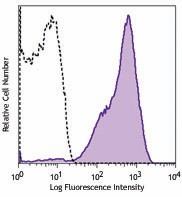
-

C57BL/6 mouse platelets were stained with purified CLEC-2 (clone 17D9/CLEC-2) (filled histogram) or purified rat IgG2b, κ isotype control (open histogram), followed by anti-rat IgG PE.
| Cat # | Size | Price | Quantity Check Availability | ||
|---|---|---|---|---|---|
| 146102 | 100 µg | $235.00 | |||
CLEC-2, also known as CLEC1B and CLEC1B1, is C-type lectin-like receptor with a single cytoplasmic YXXL sequence known as a hem-immunoreceptor tyrosine-based activation motif (hemITAM). CLEC-2 is highly expressed on resting platelets and megakaryocytes and at a lower levels on several hematopoietic cells including monocytes, macrophages, dendritic cells, and granulocytes. The first ligand that was identified for CLEC-2 was the snake venom toxin rhodocytin; podoplanin has also been identified as an endogenous ligand for CLEC-2. Exposure of platelets to rhodocytin leads tyrosine phosphorylation of the ITAM-like motif and Syk-dependent platelet activation. CLEC-2 also functions as an activation receptor on monoyctes and neutrophils to induce phagocytosis and proinflammatory cytokine production.
Product Details
- Verified Reactivity
- Mouse
- Antibody Type
- Monoclonal
- Host Species
- Rat
- Immunogen
- RBL-2H3 cells stably expressing HA-tagged mouse CLEC2.
- Formulation
- Phosphate-buffered solution, pH 7.2, containing 0.09% sodium azide.
- Preparation
- The antibody was purified by affinity chromatography.
- Concentration
- 0.5 mg/ml
- Storage & Handling
- The antibody solution should be stored undiluted between 2°C and 8°C.
- Application
-
FC - Quality tested
WB - Reported in the literature, not verified in house - Recommended Usage
-
Each lot of this antibody is quality control tested by immunofluorescent staining with flow cytometric analysis. For flow cytometric staining, the suggested use of this reagent is ≤1.0 µg per million cells in 100 µl volume. It is recommended that the reagent be titrated for optimal performance for each application.
- Application Notes
-
Additional reported applications (for relevant formats) include: Western blotting1.
-
Application References
(PubMed link indicates BioLegend citation) -
- Mourpo-Sß D, et al. 2011. Eur. J. Immunol. 41:3040. (WB)
- Product Citations
-
- RRID
-
AB_2562240 (BioLegend Cat. No. 146102)
Antigen Details
- Structure
- Type II transmembrane protein with a single cytoplasmic YXXL sequence known as a hem-immunoreceptor tyrosine-based activation motif (hemITAM)
- Distribution
-
Platelets, megakaryocytes, granulocytes, monocytes, macrophages, and dendritic cells
- Function
- Involved in platelet aggregation and secretion as well as neutrophil phagocytosis
- Ligand/Receptor
- Venom toxin, rhodocytin, and podoplanin
- Cell Type
- Dendritic cells, Granulocytes, Macrophages, Megakaryocytes, Monocytes, Platelets, Neutrophils
- Biology Area
- Cell Biology, Immunology, Innate Immunity, Signal Transduction
- Antigen References
-
1. Boulaftali Y, et al. 2013. J. Clin. Invest. 123:908.
2. Manne BK, et al. 2013. J. Biol. Chem. 288:7717.
3. Acton SE, et al. 2012. Immunity. 37:276.
4. Finney BA, et al. 2012. Blood 119:1747.
5. Kerrigan AM, et al. 2009. J. Immunol. 182:4150. - Gene ID
- 56760 View all products for this Gene ID
- UniProt
- View information about CLEC-2 on UniProt.org
Other Formats
View All CLEC-2 Reagents Request Custom Conjugation| Description | Clone | Applications |
|---|---|---|
| Purified anti-mouse CLEC-2 (CLEC1B) | 17D9/CLEC-2 | FC,WB |
| PE anti-mouse CLEC-2 (CLEC1B) | 17D9/CLEC-2 | FC |
| APC anti-mouse CLEC-2 (CLEC1B) | 17D9/CLEC-2 | FC |
| PE/Cyanine7 anti-mouse CLEC-2 (CLEC1B) | 17D9/CLEC-2 | FC |
Compare Data Across All Formats
This data display is provided for general comparisons between formats.
Your actual data may vary due to variations in samples, target cells, instruments and their settings, staining conditions, and other factors.
If you need assistance with selecting the best format contact our expert technical support team.
-
Purified anti-mouse CLEC-2 (CLEC1B)
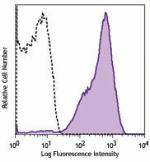
C57BL/6 mouse platelets were stained with purified CLEC-2 (c... -
PE anti-mouse CLEC-2 (CLEC1B)
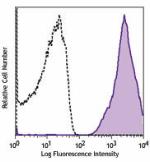
C57BL/6 mouse platelets were stained with CLEC-2 (clone 17D9... -
APC anti-mouse CLEC-2 (CLEC1B)
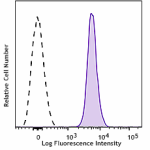
BALB/c mouse platelets were stained with anti-mouse CLEC-2 (... -
PE/Cyanine7 anti-mouse CLEC-2 (CLEC1B)
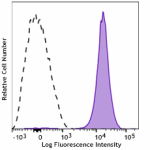
BALB/c mouse platelets were stained with anti-mouse CLEC-2 (...
